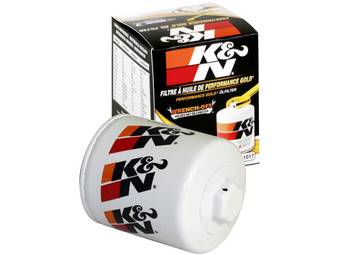Free Shipping On Orders Over $100
Select Your Vehicle
2020 GMC Yukon XL Oil Filters
What Do Oil Filters Do?
Your engine’s oiling system is crucial to its longevity and performance. Clean oil flows from the oil sump through the pickup, the oil filter, and the engine’s oil galleys to lubricate high-friction components, reducing wear and ensuring maximum efficiency.
The oil filter is an integral part of this system, filtering metal, sludge, and other impurities out of the oil to optimize oil performance and prevent excessive wear! The reduced friction extends engine life and leads to cleaner emissions. As preventative maintenance, replace your vehicle’s engine oil filter with a high-quality unit at every oil change.
Oil Filter Upgrades
Like your engine’s oil, the oil filter is a wear component, requiring a regularly scheduled replacement at manufacturer-specific service intervals. Failing to replace the oil filter can lead to poor filtration, deterioration of the filter media, low oil pressure, and excessive engine wear.
While replacing your engine’s oil filter at each oil change is recommended, some signs may indicate an oil filter replacement is necessary. These include:
Low oil pressure, typically paired with an illuminated check engine light
Dark, burnt oil
Poor performance/fuel efficiency
Abnormal engine noises, including tapping, ticking, and rattling
While factory-replacement engine oil filters are typically more-than-capable for most individuals, those who engage in spirited driving, racing, towing, or off-roading may benefit from the increased filtration of a premium oil filter, like K&N Performance Gold Oil Filters.
High-performance oil filters offer better filtration, capturing smaller-micron debris particles. They also typically feature improved oil flow, designs, build quality, and longevity.
Servicing Your Engine Oil Filter
The engine oil filter is a maintenance item. The best means of servicing this system is frequently replacing the oil filter and oil, ensuring the best lubrication and filtration. We recommend using only high-quality engine oils and filters. Replace both every 3,000–5,000 miles or at your manufacturer’s recommended service intervals.
Most oil filters are spin-on style, in which the self-contained filter spins onto a threaded stud protruding from the engine block.
Some applications also utilize cartridge-style filters, in which a replacement filter gets installed into a removable housing. With either style, follow your manufacturer’s instructions. Other tips include:
Cleaning all seat mating surfaces
Replacing seals
Lubricating seals with clean engine oil to prevent tearing and pinching
Inspecting filter and oil for metallic debris
Installing filter hand tight to prevent seizing


